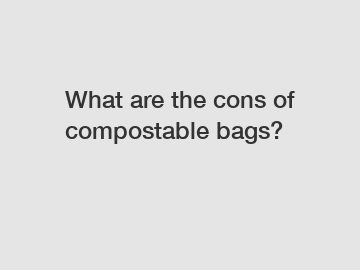Dec. 22, 2023
Chemicals
What are the cons of compostable bags?
Compostable bags, touted as a sustainable alternative to traditional plastic bags, have gained popularity in recent years. However, it is important to critically examine their drawbacks to understand their true impact on the environment. While compostable bags offer certain benefits, their cons cannot be ignored.
First and foremost, one of the main drawbacks of compostable bags is their cost. Compostable bags are generally more expensive to produce than traditional plastic bags. This can be attributed to the higher cost of materials and manufacturing processes involved in producing compostable bags. As a result, their higher price may deter some consumers from making the switch, especially when more affordable options are readily available.

Moreover, compostable bags require specific conditions for decomposition. Unlike traditional plastic bags that can persist in the environment indefinitely, compostable bags are designed to break down within a specific timeframe under specific conditions, such as high temperatures and humidity. Consequently, if these bags end up in landfills or are improperly disposed of, they may not decompose as intended, leading to the persistence of waste. This poses a significant challenge, as not all waste disposal systems have the necessary infrastructure to effectively compost these bags.
Additionally, the production of compostable bags may have its own environmental implications. The manufacturing process of compostable bags necessitates the use of energy and resources, including water and raw materials. While compostable bags are marketed as a greener alternative, their production still contributes to the overall carbon footprint. It is vital to consider the lifecycle analysis of compostable bags to accurately assess their environmental impact and compare them to other bag options.
The availability and accessibility of compostable bag recycling facilities are limited in many regions. In order for compostable bags to be truly sustainable, they need to be disposed of in specialized composting facilities. However, the necessary infrastructure for collection and processing of these bags is still lacking in many areas. This results in a reduced practicality and effectiveness of compostable bags as a sustainable solution.
Understanding the cons of compostable bags is crucial to make informed decisions about their usage. While they have the potential to reduce the environmental impact associated with traditional plastic bags, their drawbacks must be acknowledged. We must consider alternative solutions such as reusable bags or investing in waste management infrastructure that supports compostable bag disposal. By carefully examining the pros and cons, we can work towards a more sustainable future.
The company is the world’s best what is pbat, biodegradable starch resin, biodegradable resin manufacturers supplier. We are your one-stop shop for all needs. Our staff are highly-specialized and will help you find the product you need.
Previous: Why is it important for a product to be environmentally friendly?
Next: Is HPMC safe for humans?
If you are interested in sending in a Guest Blogger Submission,welcome to write for us!
All Comments ( 0 )